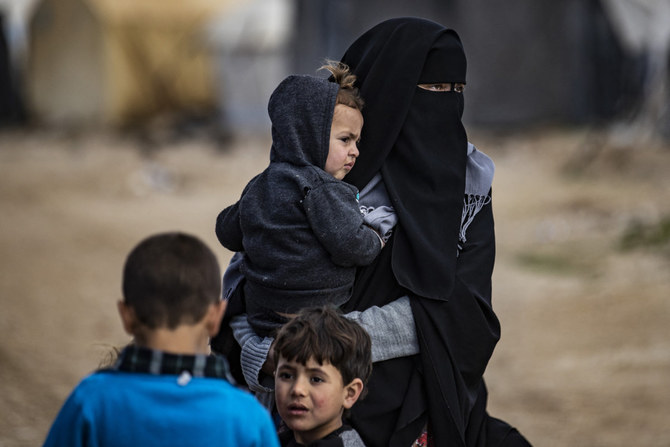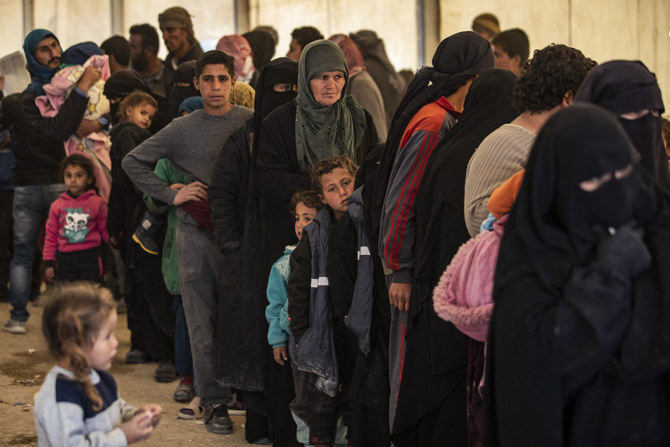LONDON: Al-Hawl and Al-Roj, two squalid, horribly overcrowded detention camps in northeast Syria, are home to some 70,000 people — around 80 percent of them women and children — all in some way associated with Daesh, the terror group that dominated a third of the country and whole swathes of neighboring Iraq between 2014 and 2017.
Among them, some 27,500 children are waiting to be repatriated. Around 975 have been repatriated since 2017 — 70 percent of these in 2019. However, repatriations fell to around 200 children in 2020, down from 685 the previous year, due in part to travel restrictions imposed by the COVID-19 pandemic. But political considerations are also in play.
Dr. Azeem Ibrahim, a director at the Center for Global Policy, Washington, D.C., who compiled a report for Arab News Research and Studies Unit based on field research in Syria and Turkey in 2020, believes the question of whether or not to repatriate these children is “unambiguous” and should be dealt with urgently.
“Everybody accepts that these children are completely innocent. Many of them were born in Syria and Iraq, many of them were born in the refugee camps, many of them were just brought over by family members at a very young age and they are now in their teens,” Ibrahim told an Arab News webinar on Thursday.
“Almost everybody accepts they are innocent parties in this conflict and should be repatriated to their countries of origin as soon as possible. Because being situated in the camps long term is not just detrimental to them, it’s actually detrimental to our security over the long term. You are essentially now grooming the next generation of Daesh radicals.”
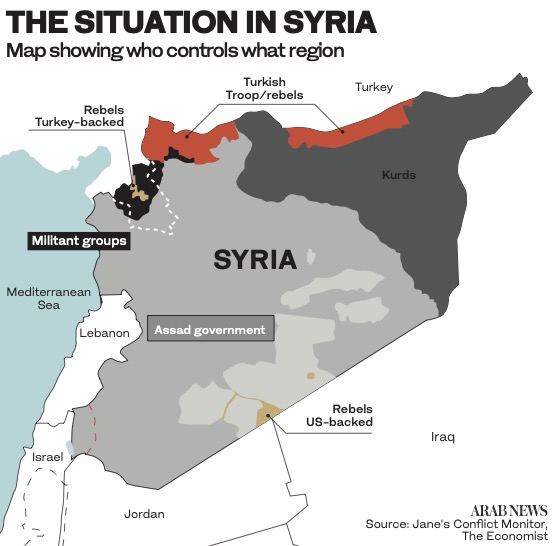
While the vast majority of the camp residents are from Iraq and Syria, about 13,500 of the children held in the camps hail from 70 different countries, including the US, Canada, Russia, Britain, France, Turkey and South Asia. Around two-thirds of the foreign children are aged under 12 — most of them under five.
According to Save the Children, some 30 percent of the under-fives screened at the camps since in early February were suffering from acute malnutrition. The World Food Program (WFP) says it has recorded several cases of dehydration and diarrhea. And conditions are deteriorating. More than 500 people died in the camps in 2019, including 371 children.

Overcrowding is one of the key health concerns, particularly given the threat of communicable diseases like COVID-19. Al-Hawl was originally established to host just 10,000 people. Today it contains 64,000.
“They suffer stigmatization, unclear status, lack of clear pathways around reintegration — their basic human rights,” said Orlaith Minogue, who participated in the same webinar in her capacity as senior conflict and humanitarian advocacy adviser to Save the Children UK.
“Throughout the camps, critical gaps exist in all sectors: water, sanitation, hygiene, health, nutrition, education and protection. Our colleagues have reported seeing children who are bowlegged, which can be the result of Vitamin D deficiency. Children’s teeth are rotting. It’s those broader medical issues that over a period of time can become quite debilitating for children.”
Tens of thousands of women and children poured out of Baghouz in Syria’s eastern Deir ez-Zor province when the Kurdish-led Syrian Democratic Forces (SDF) liberated this final sliver of territory from Daesh in March 2019, backed by the US, UK and other members of the international coalition.
Truckloads of hungry and bewildered survivors were moved from the front lines into poorly equipped camps, where they have remained under SDF guard ever since — their status unclear and their future undetermined.
Aid agencies and overstretched Kurdish authorities have repeatedly called on foreign governments to repatriate their nationals, warning further delay will cause greater suffering and loss of life and might allow radicalized inmates to escape and launch a new insurgency.
Read the full Arab News Research & Studies report here
However, foreign governments have been reluctant to take back their nationals, fearing the move would prove politically unpopular at home and pose a security threat should courts lack sufficient evidence to prosecute suspected militants.
“I have had discussions with various politicians on this topic. Their reluctance to repatriate individuals just comes down to a political calculation,” said Ibrahim. “Because if any of these individuals come back and even one of them is involved in some sort of terrorist activity, some sort of attack, a knife attack on the streets of London or Manchester or elsewhere, the first question that will be asked is, Why did you allow these people to come back?”
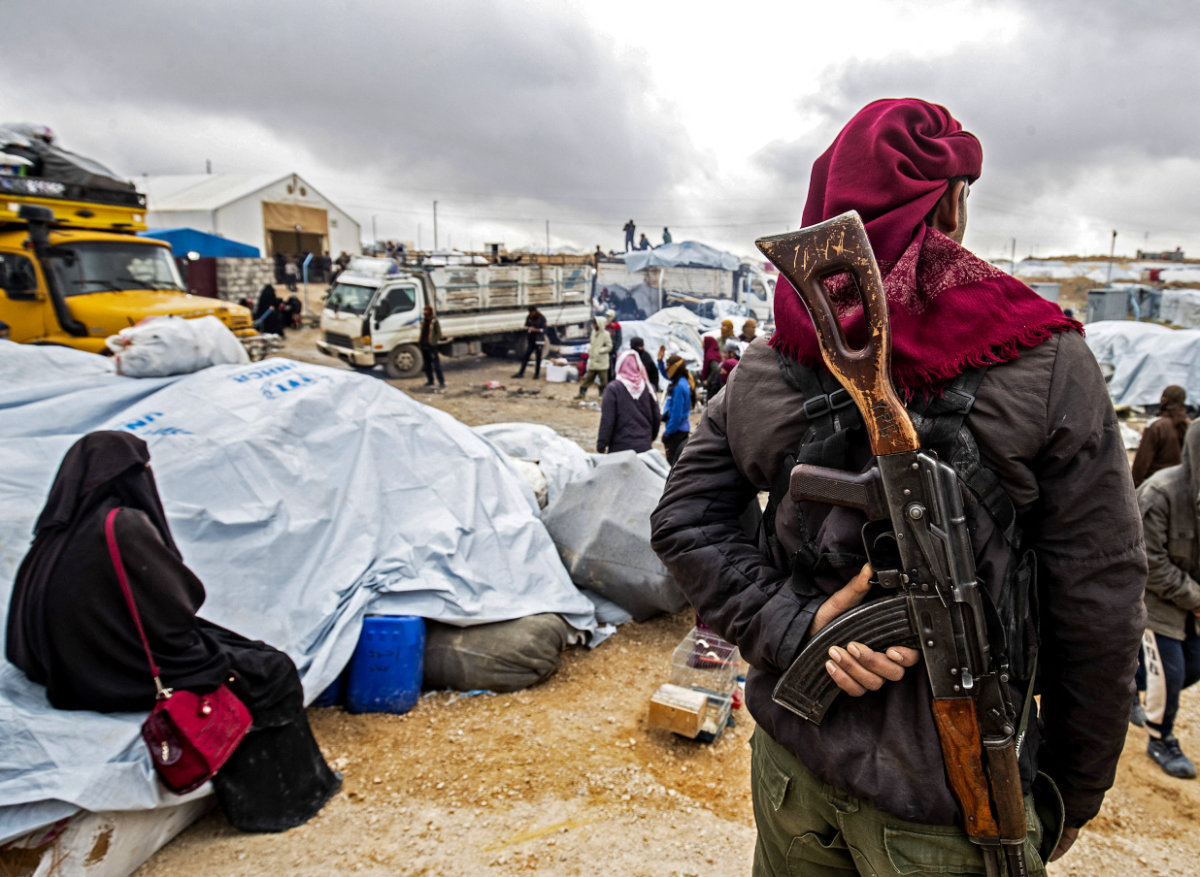
Syrians wait to leave the Kurdish-run al-Hawl camp holding relatives of suspected Daesh fighters in northeastern Syria on Nov. 24, 2020. (Photo by Delil Souleiman / AFP)
Several French nationals have been handed over to Iraq’s criminal justice system rather than face domestic courts, but human rights groups want to see far greater international oversight to prevent abuses.
Some governments have brought home women and children on a case-by-case basis — each time grappling with the moral implications of separating children from their mothers.
“We don’t believe the repatriation policy should be limited solely to unaccompanied or orphaned children or to a cumbersome case-by-case approach that has been taken on by a number of states,” said Minogue. “It has been demonstrated repatriation is feasible. We think all of these children, including those with their mothers, are innocent victims of this conflict and should be repatriated to their home countries with urgency.
“Any decisions about what happens between mother and child, should happen back in their country of origin, in capitals where there are the services and where there are the professionals who are able to make those determinations.”
When Abu Bakr Al-Baghdadi announced his self-styled caliphate on June 29, 2014, thousands of men and women from across the world heeded his call to build an “Islamic State” straddling the group’s newly conquered territories in Iraq and Syria.
Young men traveled thousands of miles to fight in the group’s ranks, while women and teenage girls, some with children in tow, came in search of the lifestyle promised to them by the group’s slick online propagandists. Instead, many found a world of barbarity and genocide, wrapped up in a warped interpretation of Islam.
Read the full Arab News Research & Studies report here
After the “caliphate” fell, the children born to these foreign recruits found themselves trapped in a kind of legal limbo — effectively citizens of nowhere.
Since the group’s territorial defeat in early 2019, there has been mounting concern about a potential resurgence among youngsters hardened by life in the camps.
The recent spate of murders in Al-Hawl shows “how unsustainable the situation is when you have many thousands of children essentially living out their childhoods in this dangerous, volatile situation,” said Minogue.
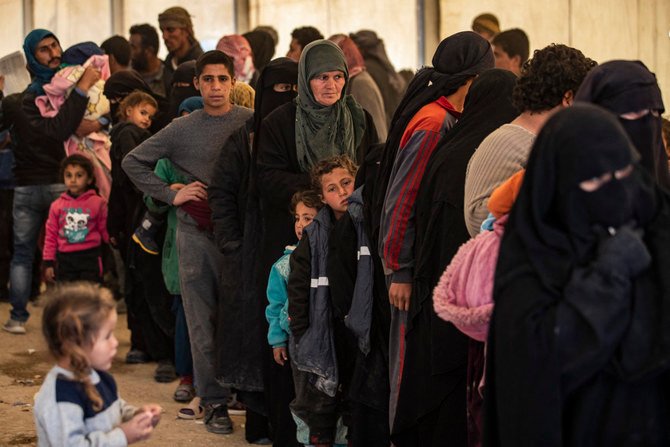
Syrians wait to leave the Kurdish-run al-Hawl camp holding relatives of suspected Daesh fighters in northeastern Syria on Nov. 24, 2020. (AFP)
“It’s never in the interests of a five-year-old child to languish in a camp with no services, among armed groups in a conflict zone. The idea that they know nothing else is very sad.”
Experts agree that the only way to defuse the potential threat in the long run is through rehabilitation and deradicalization, including psychological, psychiatric and spiritual support, to reintegrate these children into mainstream society.
Ibrahim wants to see young people removed from the camp environment immediately and moved to juvenile rehabilitation centers, where they can begin pro-socialization initiatives, with expertise from foreign governments and aid agencies.
However, the political will needed to resolve the issue has long been lacking, leaving the camps woefully underequipped, aid agencies underfunded and the chances of salvaging these childhoods even slimmer.
Read the full Arab News Research & Studies report here
_______
• Twitter: @RobertPEdwards


